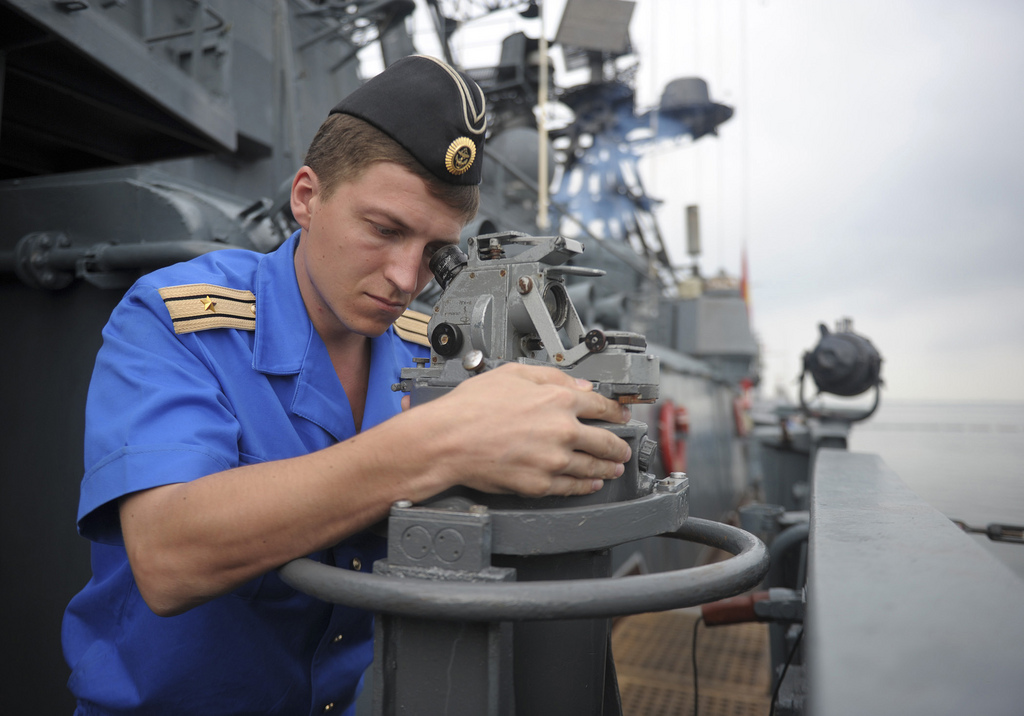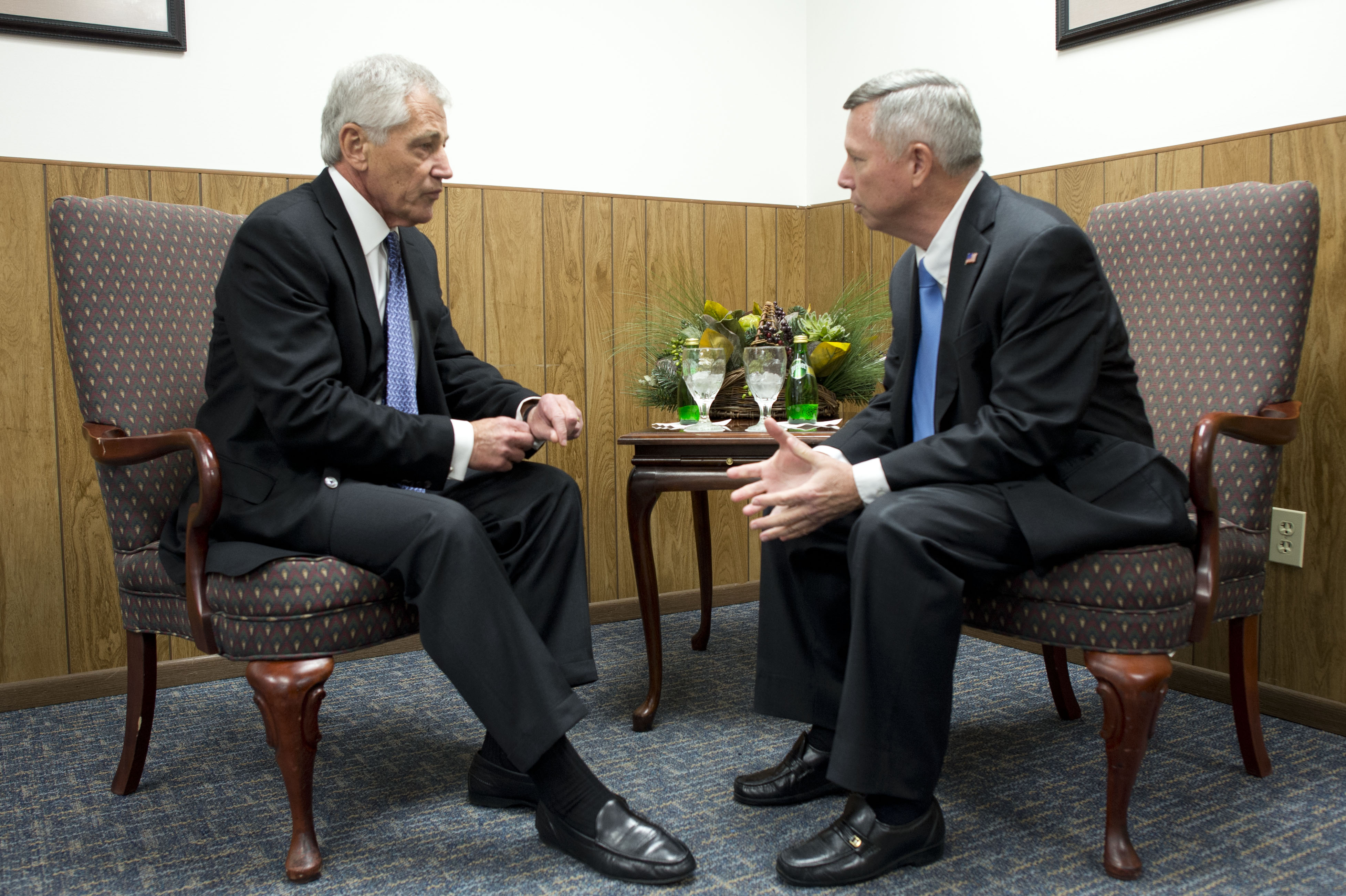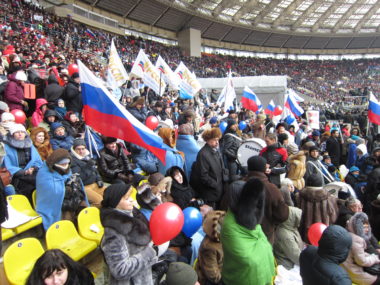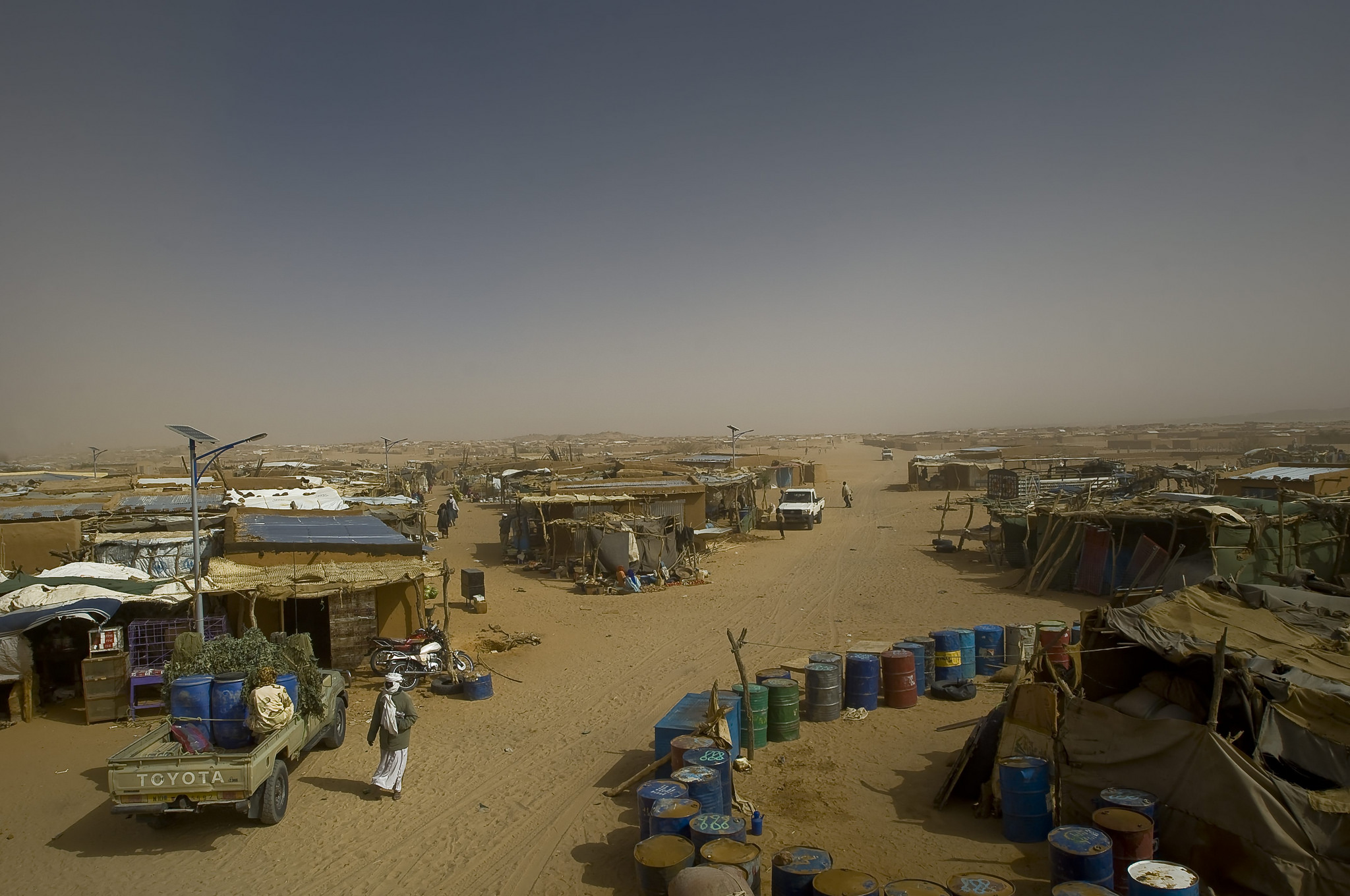By Andrew Kydd

Russian troops have moved into the Crimean peninsula, but Vladimir Putin is running silent as Clarence Thomas. We can only speculate on his goals and strategy. Is he trying to acquire a beachfront locale for a summer Olympics bid? Probably not, but what other reasons could possibly explain his behavior? The key, I think, is that Putin is determined to overcome Russia’s quarter century of humiliation. He is the anti-Gorbachev, the anti-Yeltsin. He wants to make it clear that he is not averse to using force to prevent westward drift within Russia’s sphere of influence.
Following from this premise are two possible strategies behind the Crimean gambit. First, he could be intending to use Crimea as a bargaining chip with a future Ukrainian leadership that emerges in Kiev. He is clearly not happy with the way things turned out for his friend Viktor Yanukovych, the former president of Ukraine. Yanukovych was under his thumb, while the current government, such as it is, will want to lean west and away from Russia. Where a Gorbachev or a Yeltsin would have supinely accepted this, Putin bargains harder. By seizing Crimea he can confront an eventual Ukrainian leader with a difficult choice. Go west if you like but you are going to lose Crimea, and perhaps even more provinces in the eastern half of the country. Or you can stop challenging Moscow and we let you keep your country. When Moscow says jump, you say how high? Putin may be hoping that this kind of leverage will suffice to keep Ukraine in the fold, a big Belarus that understands its place in the universe.
The alternative is that Putin has written off Kiev and western Ukraine but is determined to salvage something from the debacle. Stephen Walt argued that revolutions attract predation from the international system, viz. Iraq’s invasion of Iran in 1980. When states are weak, as they are in the aftermath of revolutions, aggressors pounce. Ukraine is certainly weak now, and determined to throw off Russia’s yoke. An all-out invasion of Ukraine to restore Yanukovych may seem prohibitively costly, but liberating the Russian-speaking provinces may appear more practical and achievable. It would certainly send a signal that crossing Moscow is very dangerous, and it would bring direct tangible benefits by bringing home Russian territory and populations while greatly weakening the rump Ukraine. Putin, the recoverer of lost territories! Putin as Bismarck!
These two options are related of course. The willingness to pursue the partition strategy is what gives the bargaining strategy its credibility. Putin may be unsure how reasonable the future Ukrainian leadership will be. He may prefer a unified Ukraine under Moscow’s sway to a partition, but be unsure if he can get it. Or he may prefer partition. In either case, Kiev has some real choices ahead.







0 comments
It’s possible that Putin and the Russian government simply overreacted without a real plan. When you think about it, they could have used proxies to stir up trouble or waited for the Ukrainian government to realize how much money Russia can give them without the strings from the West.
Instead they’ve gotten a general Ukraine that’s probably furious, a Crime that they might not be able to hold (it’s been noted by Slate that Ukraine provides all of the electricity and most of the food) and Russia has just reminded Europe why NATO exists.
So it’s possible this is all planned out by Russia, but it’s at least as possible that they just leaped before they looked.
Yeah, I agree, and don’t really get the argument that Putin’s a master chess player constantly pulling one over on Obama. Regardless of what Russia’s goal in all this is, even if things go perfectly Russia risks 1) an extremely anti-Russian voting bloc in Ukraine, 2) the truly terrifying prospect of things spiraling out of control into a civil war on Russia’s borders, or 3) a Crimean population that may have different ideas than Russia’s, whether autonomy, internationally-unrecognized independence, or annexation.
All this on top of a military intervention that makes the invasion of Iraq look globally popular (though at much lower levels of passion), probably in service of an outcome that’s worse for Russia than the pre-Euromaidan status quo.
Yeah but the problem still remains that Ukraine is essentially bankrupt. So sure the Russians antagonized the Ukrainians now but let them implement the structural reforms of another possible EU/ECB/IMF troika and in 5 years, you’ll have another pro-Russian leader elected.
US/EU overplayed their hand here, unfortunately. Not to mention all the Putin mind-reading and how’s he gonna stay nice and play along. I mean really, that’s rich. Is Putin overplaying his hand too? Most probably but then again, the Russians were never going to win a soft-power game.
In Ukraine they could win with soft power. Large Russophone population, strong economic ties, corrupt government and a need for money with no reform strings attached. Putin could have waited this out. Instead he decided to carve off Crimea, and this is the 21st century. Territorial changes to your nation stopped being something you could politically shrug off by the start of the 19th.
And what about Ukraine’s neighbors? Poland, Hungary, the Czech Republic and Slovakia (the Visegrad Group) already announced the creation of a joint battlegroup a few years ago and all of them are members of NATO. This is the sort of thing that makes them more eager for European and NATO unity, not less.
Sure, no doubt about it… I was referring to soft power in relation to the Western powers, not to the Ukrainians. And here we’re talking mainly about the Western ones who weren’t ever that keen on Russia to begin with. The maps are pretty clear in this regard.
And with America losing moral high ground, it made it very easy to play legitimate whataboutism. You don’t create precedents and then expect no one to follow suit. Some borders are inviolable, some aren’t. This was to be expected.
As for the Visegrad Group,where with the exception of Orban in Budapest who’s playing around with the far right card for electoral gains (you don’t think he’d like to carve out another HarCov from Romania, there’s a fermenting autonomous region in the making), it’s not like they’ve amended their foreign policies options in the last couple of years in regards to EU or NATO. Except now you have Poland acting from its own maligned sphere of influence.
And there aren’t even that many pro-Russian voices in these countries, if they are they’re insignificant or sidelined. If you look at the Eurobarometres, Central and Eastern Europeans still maintain high levels of trust in the EU and its institutions. So there wasn’t that big of an Eastern trend to begin with. Unless you’re looking at Germany’s energy interests.
In so far, Crimea was a show of force for now, if it degenerates, that’s another story. But really, the West got a bit greedy here, they miscalculated and they messed up. That proposed EU agreement was a joke. Also you don’t invest 5 billion dollars and send a neocon like Neuland if you don’t want a regime change and to piss off Putin. Obama drew another stupid red line. This whole situation turned into a proxy debacle at the expanse of the Ukrainians.
If the media would stop being honest and start using propaganda for just a few minutes, it would be clear that if you apply the same rules of “right and wrong” to the population of Crimea as you do to Ukraine, then the most-correct thing is to allow Crimea to secede and ally itself with Russia. Really not such a big deal.
Just as in Ukraine, there is a *minority* of some 8 millions of Russians who are rightfully scared of an ultra-nationalist government in Kiev seeking revenge, in Crimea, there is a *minority* of hundreds of thousands of Ukranians, who are rightfully scared of living in a pro-Russian state. Nevertheless, both these groups are not the biggest group. If we really supported democracy.
But we don’t support democracy so it’s all rather academic. The decisions are made in New York for the most part, Washington sometimes, and in rare instances, Beijing. Moscow wants to play but we won’t let them sit at the cool kids’ table.
It wouldn’t be a big deal except that Washington has a serious inferiority complex about taking orders from New York (who is perfectly prepared for a rational negotiation based on dollars and cents), so Washington tries to beat up everyone else (except New York and Beijing and Moscow, that is), regardless of whether they are actually justified. Just that when they stray too far into strange neighborhoods they get lost. This is such a case.
To start it’s a pretty big thing in geopolitics for borders to stay the same as they are. With your argument we could just as easily say that Chechnya should be allowed to secede from Russia and ally with America.
And I really have no idea what democracy has to do with your following sentence “Nevertheless, both these groups are not the biggest group”.
And your last paragraph is simply… I have no idea what it even is intended to mean. New York? New York is a state in the United States and New York city is a city in the United States. Both are legally part of the United States, why would Washington (by which I assume you mean Washington D.C.) have a problem with either of them? The absolute best I can do is guess that you’re talking about the United Nations in New York city, but that really makes little sense.
‘New York’ is doubtless a metonym for another metonym, ‘Wall Street’, i.e. the actual ruling class of the United States. I disagree that Wall Street and Main Street (Washington) are at odds; the latter, I am sure, is substantially under the thumb of the former, although it is allowed to whine from time to time.
As for what Putin’s up to, I imagine he’s putting everybody on notice that Russia is back. This was observed in 2008 with reference to the Georgian adventure, but seems to have been forgotten by the various persons and groups pushing sticks into Ukraine to see what will happen. Probably, he won’t have to do much more. The EU (i.e. Germany) doesn’t really want to bail out Ukraine, especially if there is going to be a lot of trouble — like, with the gas supply. The Ukrainian nationalists will be obliged to put on several exhausting shows — mobilizing armies isn’t cheap — while Putin does nothing. Maybe the U.S. will put up the 15 or 20 billion, but what are they going to get for the money?
Precisely.
Going in reverse:
New York city, but not the U.N.
New York City, the financial capital of the most powerful country in the world. Washington D.C. must ultimately bow to this greater power.
The fact that Russians are a minority in the Ukraine means that, if I believe in democracy, I should conclude that it is more correct for the Ukranian-nationalists to have control of Ukraine, than for pro-Russians to control Ukraine.
By the exact same argument, the fact that Russians are a majority in Crimea means that, if I believes in democracy, I should conclude that it is more correct for pro-Russians to have control of Crimea, than for Ukranian-nationalists to control Crimea.
To argue both ways is hypocrisy. Therefore, people resort to the “sanctity of borders” argument.
So we get to this point. The belief that borders are somehow sacred.
First objection is the presumption that the borders were decided wisely in the first place… otherwise, borders created as a result of a great injustice would make the great injustice permanent.
Second objection is on practical grounds- if the reason for not changing borders is to have peace and stability, you must consider cases where the borders themselves result in war and IN-stability. For instance, in former Yugoslavia. Serbs and Croationans both believed they had the right to full control of everything within the borders they grew up in. That was a poor situation. Placing them into separate countries was a better situation- no more reason to fight. A similar situation exists in Crimea.
Finally, it is important to separate moral considerations from power-“geopolitics” considerations. For example, the Chechens have an excellent moral case for independence from Russia. However they are not powerful enough to make it happen alone, they have little economic value to the enemies of their main enemy, and some of them also happen to be islamic terrorists/freedom-fighters and the US hates islamic terrorists/freedom-fighters, so the Chechens cannot expect help from the US unless the US abandons the war on terror. This is actually happening a little bit in Syria so who knows. So it is not a matter of moral correctness, but of geopolitics.
Similarly, in Egypt. We took some effort to allow a democratic election to happen. But when the population voted for the wrong side, we did not object to a military coup who removed the wrong side from power immediately after the election. Again we have to respect the difference between moral considerations and power-geopolitics considerations.
In the case of Crimea, all of these factors lean toward allowing Crimea to be independent (and effectively subordinate to Russia). It would remove a large number of pro-Russians from the remaining Ukraine, making it MORE stable. It would concede that the Russians are right there and have quite a bit of power over the place, which it would be idiotic to ignore. And it would be democratic, since a majority of the Crimean population is pro-Russian.
A naive question, but is the treaty with Ukraine giving Russia a lease to the harbor in Sevastopol irrelevant? Is it possible that Russia is worried that a new Ukrainian government would balk at continued implementation? Could this in part be about actual military capabilities, not just reputation?
Well I think it’s safe to assume that fears over what happened did include worries about the port. I simply also think that Putin’s actions are a sign of fear, rash thinking and a desperate need to show himself as a tough leader for fear of something similar to Kiev happening in Moscow.
Today’s by all accounts confusing press conference by Putin seems to support your assessment.
Russia has historically been a power-seeker, and to that end exploits opportunities as they arise to increase its power at the expense of its neighbors. Knowing that there is no chance of a military intervention by the US or NATO, Putin has a free hand to exploit others’ overreach or chaos.
Kiev’s choice is not unlike that faced by Finland late in World War II. It has no ally that will come to its aid, and Russia is capable of inflicting great damage even if outright conquest is unlikely. So its best option is to make the settlement it can: transfer Crimea to Russia, and perhaps the eastern regions with Donetsk and Kharkiv, in exchange for domestic autonomy.
in what way does this makes them different from other powerful countries, such as the US?
What great power hasn’t been power-seeker, historically speaking? Because we’re talking great powers here not small fries like Slovenia. I don’t see Romania making the same kind of statements as Poland – both neighbor Ukraine. The former has been an important European power before being divided by other powers, while the first has usually been in the bandwagon.
As far as great damage goes, sure Russia could do a lot but that’s all going to get back at it. Like shooting one’s foot. Further it goes in Ukraine, further it ends up with only China as a willing partner. And all this current military posturing, it’s not going to make it an equal partner in the eyes of the Western states. That’s what they’ve wanted for the last 20 years. Unless a Yeltsin figure gets elected, they’re never going to be on par with the West. Currently, I doubt a pariah status is going to help their cause. On the other hand, the more the Western shills compare Putin to Hitler, call him silly names and what have you, the stronger he gets in Russia. Sure the oligarchs might not want their assets seized abroad but when it gets to the votes, the majority wins. The Russian liberals can keep throwing tantrums and benefit from foreign aid but they’re not going to get Navalny elected president any time soon.
Anyway the public discourse is hazardously belligerent and hypocritical. US created too many precedents in order to start preaching rules of international law. Frontiers are sacrosanct only when it suits them. And when Nuland and McCain were roaming around Kviv, apparently that was okay. That was not a foreign intervention in local affairs. Those two neocons were to busy spreading democracy. I mean really, everything gets mind-numbing after a while.
I think Putin, more than anything, wants to make sure Crimea stays in his control. I’m not sure that there’s really much desire for him to get all of Ukraine, as it’s fairly clear that Ukraine as a whole might go European. But if he can set himself up in Crimea early, he’ll have a better position when things come to the negotiation table. Crimea and the Black Sea have always been very important to Russia, being a northern country. The Ukrainian “government” went at this in such a haphazard fashion that I’m sure he just took the opportunity. Whoever was behind the Kiev coup is completely inept.
Yeah but as a previous commentator said, there was no need for intervention since they’d followed soon. Not even Ukrainians perceived Crimea to be Ukrainian. So, he’s making a statement. Where it gets nasty and dangerous, is in regards to Kharkov, Donetsk, Dnipropetrovsk. In Crimea, you’ve got the bases, the fleet, there’s a sort of logic. It’s a strategic zone, it was Russian in the past. But doing anything in the continental cities, would be disastrous both for Ukraine as well as Russia. Partition there would just be a hot spot that’s in nobody’s interests.
In this case both parties – the West and Russia – overestimated their chances, considering how in all the former electoral cycles, the country was basically split 50/50. But even those pro-westerners, I don’t know what exactly they think they’re going to get from EU. Free movement in the EU? The Westerners are tired of Polish, Romanian and Bulgarian workers. The last thing they want is Ukrainian white trash. It’s crass but it’s the truth. Sure everyone’s free to do whatever they want, but a dose of realism is needed. Because milk and honey, EU it’s not.
Another aspects that’s jarring is that the far right is so whitewashed in the West. It’s like sure there are some extreme elements but nothing to worry about. Well those extreme elements made it easier for the Russians to say that is was a coup and not a revolution. I mean really, Bandera in the XXIst century. I doubt those kids even know who he was. And they can’t all be Russian provocateurs as many’d like to think. How’s that even logical?
All across the board, the parties have acted reckless. And if relations keep getting worse, where Ukraine’s supposed to take its gas, gas that it can’t pay for. Prolly from fracking.
In Ukraine’s case, a tripartite agreement would’ve been best. Kept Putin, happy. Saved the Europeans, some money. In the heat of events, everyone got greedy. And wars have been known to start for lesser offenses.
“Putin as Bismarck” is perfect. And Crimea is the new Alsace-Lorraine, poisoning relations for years to come.
Putin proves his holding strength, determination and efficiency. To maintain his position he sometimes need to act, diplomacy is not always enough.